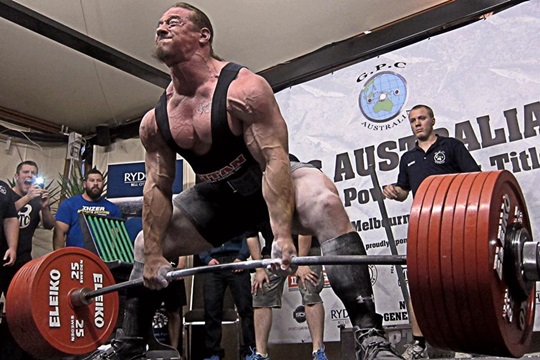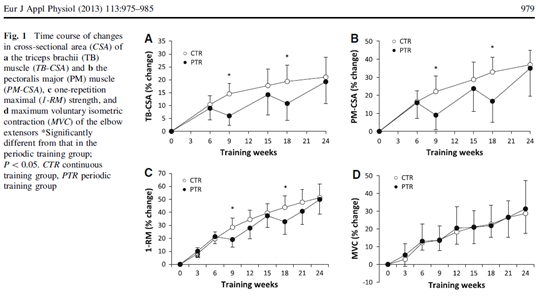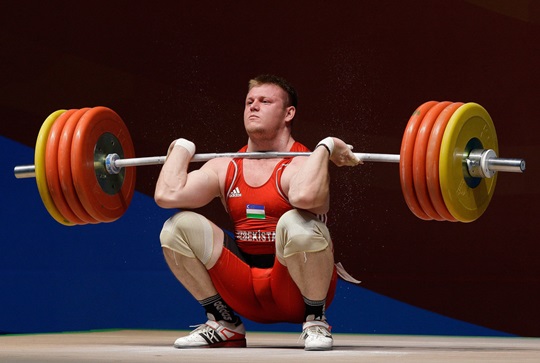Will Taking a Break From Weight Training Hurt Your Progress in the Gym? « AnthonyColpo
If you would prefer a traditional black-type-on-white-background view of
this page, please click the little green icon to the left.
If I told you that after every six weeks, you could stop lifting
weights and enjoy a 3-week holiday from the gym, yet still make just as
much progress as someone who trained continuously, you’d probably think I
was crazy.
But that’s exactly what Japanese researchers observed in a recent and very interesting study.
Remember Me?
Anyone who’s been lifting weights for any meaningful length of time knows about “muscle memory”.
It’s the much-loved phenomenon in which your muscle and strength
levels, having receded during a lay-off, return with remarkable rapidity
after you start hitting the gym again.
The Japanese study shows this effect may be even more powerful than we’ve realized.
The researchers recruited a bunch of untrained young guys (mean age =
25), divided them into two groups, and then got them to do bench
presses for 6 months.
One group trained continuously for the full 24 weeks doing 3 sets of ~10 reps, 3 times per week.
The other group did the same routine, but trained for 6 weeks, then
had a 3 week detraining period where they just went about their usual
activities. As a result, they only trained for 18 of the the 24 weeks.
All training sessions were overseen by a supervisor, and the training
load was renewed every 3 weeks; if subjects could perform 12 reps or
more at the 3rd set during training sessions, the training load was
increased around 5% for the next training session.
The researchers hypothesized that because atrophy (muscle loss) from
stopping weight training occurs at the same rate or slower than it was
gained, and previous research had shown muscle growth occurs faster after a detraining period, then the detraining group should still get similar results to the group who trained continuously.
And that’s exactly what happened.

Despite having 3 weeks off after every 6 weeks, at 24 weeks the
detraining group experienced the same weight, size, isometric strength
and one-rep maximum (1RM) gains as the continuous group.
Below is Figure 1 from the paper, which shows quite nicely the
contrast between the continuous and zig-zag pattern of gains in the 2
groups (the trajectory with the black dots represents the de-training
group, the trajectory with the white dots belongs to the continuous
group).

In the detraining group, which enjoyed a total of 6 weeks away from
the gym, there were 25 % fewer total training sessions and a 33.5 %
reduction in total training volume throughout the 24-week training
period.
During that time, the continuous group hoisted a total of 96,942 kg, while the detraining group lifted a ‘mere’ 64,509 kg.
And so in this study, beginning bench pressers who took a 3-week
break every 6 weeks got the same results as the poor bastards who
trained continuously.
If only they did this study when I was starting out!
The researchers also noted that the de-training group exhibited an
identical increase in tricep and pectoral hypertrophy during the second
retraining period (weeks 18–24). They speculated that
“If the same retraining effects occurred after 24 weeks of training,
and if continuous long-term training induced decreased muscle
adaptations, 3-week detraining/6-week retraining cycles may produce greater muscle hypertrophic responses compared with continuous training cycles after 24 weeks.” (Bold emphasis added)
A number of caveats should be noted at this point:
–The subjects only did bench presses (but, theoretically, whole body
training is more exhausting and therefore even more demanding of regular
breaks).
–They were previously untrained (but modified versions of
detraining/tapering etc are routinely used by top coaches with advanced
athletes).
–In Olympic weight lifting, the lifts have much more of a technical
skill component, so the better strategy would likely be to periodically
lower the weight and volume (which is just what top weightlifting
coaches advise).
–Except during the early off-season, athletes in some sports may suffer
competitively if they lose strength at regular intervals, even if that
strength is later recovered at a rapid rate.
–The study was performed in Japan, a country with more temperate habits
and hence superior life expectancy and lower obesity rates than
countries like the US. Meaning that during their 3 weeks off, the young
blokes in this study were highly unlikely to have partaken in the kind
of Western gastronomic and alcoholic gluttony that would’ve ruined their
previous training gains.

Practical Application
Top coaches have known for years that periods of reduced
volume/intensity and “back-off” weeks are essential to preventing
burnout and ensuring continued progress in their athletes.
This study takes the concept further by showing that, at least in
novice lifters, complete and rather lengthy breaks from training do not
harm progress.
Hopefully, further research will be done on this highly promising
subject to determine a detraining schedule that doesn’t just match the
progress from continuous training, but surpasses it. And hopefully that
research examines not just beginners but more advanced trainees also.
My Personal Experience
Several years ago for preventive health reasons, I set about lowering
my elevated serum ferritin (the most reliable marker of bodily iron
stores) down to around 30 mcg/l. To do this, I estimated I’d need 5-6
blood withdrawals spaced 4 weeks apart.
Sounds simple enough, but there was a problem – dropping half a litre
of blood in several minutes, as occurs during phlebotomy, isn’t without
potential consequences. Previous experience had shown me that having a
withdrawal while conducting my usual high volume training routine was a
recipe for disaster – I’d feel drained for days afterwards as my body
struggled to restore my oxygen-carrying capacity back to normal.
And so I came up with a plan: I’d train my butt off for 3 weeks
straight, then take an entire week off from training. In the middle of
that week off, I’d have my blood withdrawal.
Despite my intention to train like a mad man during the 3 weeks prior
to every off-week, I still worried that my progress in the gym would
suffer.
I shouldn’t have. Rather than experience regression, I made significant gains in size and strength during that time.
Not to mention that having a complete week away from the gym opened up a lot more time for other activities.

The experience was a real eye-opener, and saw me shift my training
programming away from 6-week blocks (3 weeks of high volume followed by 3
weeks of low volume) to 4-week blocks in which the fourth week was
either a “deload” week or a complete week off.
A lot of folks who commence weight training develop a fear that if
they miss even a couple of workouts their progress will be irreparably
harmed. Granted, having a slap-dash, erratic approach approach to
training is a surefire way to ensure lacklustre gains, but this study
shows that intelligently scheduled breaks will not hurt your progress.
As a bonus, you get more time to spend on other activities and, along
with your body, your mind gets a much-needed rest from the rigors of
training.
Cheers,
Anthony.
Anthony Colpo is author of The Fat Loss Bible , The Great Cholesterol Con
, The Great Cholesterol Con and Whole Grains, Empty Promises.
and Whole Grains, Empty Promises.
Source:
this page, please click the little green icon to the left.
If I told you that after every six weeks, you could stop lifting
weights and enjoy a 3-week holiday from the gym, yet still make just as
much progress as someone who trained continuously, you’d probably think I
was crazy.
But that’s exactly what Japanese researchers observed in a recent and very interesting study.
Remember Me?
Anyone who’s been lifting weights for any meaningful length of time knows about “muscle memory”.
It’s the much-loved phenomenon in which your muscle and strength
levels, having receded during a lay-off, return with remarkable rapidity
after you start hitting the gym again.
The Japanese study shows this effect may be even more powerful than we’ve realized.
The researchers recruited a bunch of untrained young guys (mean age =
25), divided them into two groups, and then got them to do bench
presses for 6 months.
One group trained continuously for the full 24 weeks doing 3 sets of ~10 reps, 3 times per week.
The other group did the same routine, but trained for 6 weeks, then
had a 3 week detraining period where they just went about their usual
activities. As a result, they only trained for 18 of the the 24 weeks.
All training sessions were overseen by a supervisor, and the training
load was renewed every 3 weeks; if subjects could perform 12 reps or
more at the 3rd set during training sessions, the training load was
increased around 5% for the next training session.
The researchers hypothesized that because atrophy (muscle loss) from
stopping weight training occurs at the same rate or slower than it was
gained, and previous research had shown muscle growth occurs faster after a detraining period, then the detraining group should still get similar results to the group who trained continuously.
And that’s exactly what happened.

Despite having 3 weeks off after every 6 weeks, at 24 weeks the
detraining group experienced the same weight, size, isometric strength
and one-rep maximum (1RM) gains as the continuous group.
Below is Figure 1 from the paper, which shows quite nicely the
contrast between the continuous and zig-zag pattern of gains in the 2
groups (the trajectory with the black dots represents the de-training
group, the trajectory with the white dots belongs to the continuous
group).

In the detraining group, which enjoyed a total of 6 weeks away from
the gym, there were 25 % fewer total training sessions and a 33.5 %
reduction in total training volume throughout the 24-week training
period.
During that time, the continuous group hoisted a total of 96,942 kg, while the detraining group lifted a ‘mere’ 64,509 kg.
And so in this study, beginning bench pressers who took a 3-week
break every 6 weeks got the same results as the poor bastards who
trained continuously.
If only they did this study when I was starting out!
The researchers also noted that the de-training group exhibited an
identical increase in tricep and pectoral hypertrophy during the second
retraining period (weeks 18–24). They speculated that
“If the same retraining effects occurred after 24 weeks of training,
and if continuous long-term training induced decreased muscle
adaptations, 3-week detraining/6-week retraining cycles may produce greater muscle hypertrophic responses compared with continuous training cycles after 24 weeks.” (Bold emphasis added)
A number of caveats should be noted at this point:
–The subjects only did bench presses (but, theoretically, whole body
training is more exhausting and therefore even more demanding of regular
breaks).
–They were previously untrained (but modified versions of
detraining/tapering etc are routinely used by top coaches with advanced
athletes).
–In Olympic weight lifting, the lifts have much more of a technical
skill component, so the better strategy would likely be to periodically
lower the weight and volume (which is just what top weightlifting
coaches advise).
–Except during the early off-season, athletes in some sports may suffer
competitively if they lose strength at regular intervals, even if that
strength is later recovered at a rapid rate.
–The study was performed in Japan, a country with more temperate habits
and hence superior life expectancy and lower obesity rates than
countries like the US. Meaning that during their 3 weeks off, the young
blokes in this study were highly unlikely to have partaken in the kind
of Western gastronomic and alcoholic gluttony that would’ve ruined their
previous training gains.

Practical Application
Top coaches have known for years that periods of reduced
volume/intensity and “back-off” weeks are essential to preventing
burnout and ensuring continued progress in their athletes.
This study takes the concept further by showing that, at least in
novice lifters, complete and rather lengthy breaks from training do not
harm progress.
Hopefully, further research will be done on this highly promising
subject to determine a detraining schedule that doesn’t just match the
progress from continuous training, but surpasses it. And hopefully that
research examines not just beginners but more advanced trainees also.
My Personal Experience
Several years ago for preventive health reasons, I set about lowering
my elevated serum ferritin (the most reliable marker of bodily iron
stores) down to around 30 mcg/l. To do this, I estimated I’d need 5-6
blood withdrawals spaced 4 weeks apart.
Sounds simple enough, but there was a problem – dropping half a litre
of blood in several minutes, as occurs during phlebotomy, isn’t without
potential consequences. Previous experience had shown me that having a
withdrawal while conducting my usual high volume training routine was a
recipe for disaster – I’d feel drained for days afterwards as my body
struggled to restore my oxygen-carrying capacity back to normal.
And so I came up with a plan: I’d train my butt off for 3 weeks
straight, then take an entire week off from training. In the middle of
that week off, I’d have my blood withdrawal.
Despite my intention to train like a mad man during the 3 weeks prior
to every off-week, I still worried that my progress in the gym would
suffer.
I shouldn’t have. Rather than experience regression, I made significant gains in size and strength during that time.
Not to mention that having a complete week away from the gym opened up a lot more time for other activities.

The experience was a real eye-opener, and saw me shift my training
programming away from 6-week blocks (3 weeks of high volume followed by 3
weeks of low volume) to 4-week blocks in which the fourth week was
either a “deload” week or a complete week off.
A lot of folks who commence weight training develop a fear that if
they miss even a couple of workouts their progress will be irreparably
harmed. Granted, having a slap-dash, erratic approach approach to
training is a surefire way to ensure lacklustre gains, but this study
shows that intelligently scheduled breaks will not hurt your progress.
As a bonus, you get more time to spend on other activities and, along
with your body, your mind gets a much-needed rest from the rigors of
training.
Cheers,
Anthony.
Anthony Colpo is author of The Fat Loss Bible
Source: